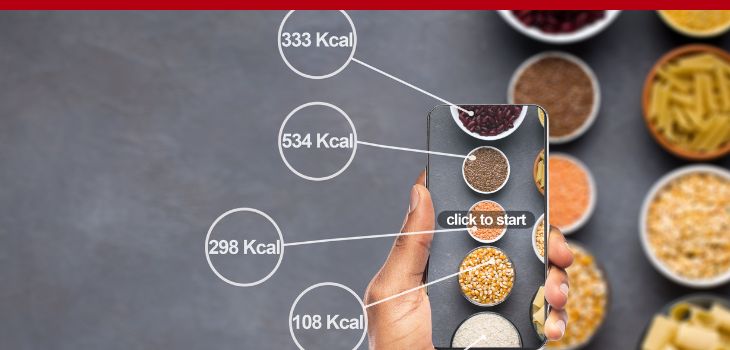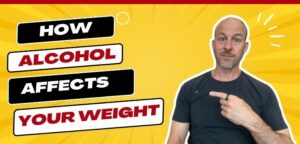by Ted Ryce
Ted Talk 190: Are Calories All That Matter For Weight Loss? - Ask Ted
by Ted Ryce
by Ted Ryce
Ted Talk 190: Are Calories All That Matter For Weight Loss? - Ask Ted
Ted Talk 190: Are Calories All That Matter For Weight Loss? - Ask Ted
more
by Ted Ryce
Ted Talk 190: Are Calories All That Matter For Weight Loss? - Ask Ted
Are you confused about how to actually lose fat? You’re not alone. We live in a world where influencers, self-proclaimed experts, and internet gurus bombard us with contradictory advice on a daily basis. One minute, you’re told to avoid certain “toxic” substances like the plague, and the next, you’re encouraged to follow the latest fad diet that promises miraculous fat loss. It’s enough to leave anyone feeling confused and frustrated.
In today’s Ask Ted episode, Ted is going to answer the question “Are calories all that matter for weight loss?”.
He delves into the misconception that toxins and endocrine-disrupting chemicals are the primary contributors to obesity and reveals why it’s essential to separate these concerns from the core principles of fat loss.
He breaks down the complexity of fat loss, emphasizing that calories play a significant role in determining weight, and he reveals some other important factors that also influence the weight loss process. Listen now!
You’ll learn:
- Why endocrine-disrupting chemicals are not the primary cause of obesity?
- The significance of calorie deficit in weight management
- The role of resistance training and protein intake in promoting fat loss and preserving muscle mass during a weight loss journey
- How focusing solely on the scale can be misleading and the other metrics that are equally important for tracking progress
- The importance of a nuanced approach to fat loss
- The benefit of being data-driven in your approach
- The challenges you may face during their fat loss journey and how to overcome them
- Important principles that lead to sustainable results and long-term health…
- Real-life examples and client experiences shared by Ted to illustrate effective these strategies
- And much more…
Related Episodes:
Ted Talk 170: Should You Track Your Calories? – Ask Ted
539: Avoid These 7 Nutrition Myths If You Want To Lose Weight with Danny Lennon
Links Mentioned
Want To Lose Fat, Transform Your Body & Live Your Best Life In 2023?
I’m offering this blueprint that will lead you to a fail-proof long-lasting result with your body, with your health that will help you reach that potential that you have inside and become your own super self.
If you’re interested in working with me, schedule a Breakthrough Call and we will discuss your goals, challenges and see if we are a good fit.
>>Click Here To Schedule A Call With Me Now!
Podcast Transcription: How To Develop Emotional Resilience To Anxiety And Stress
Ted Ryce: Are you a bit confused about what actually leads to fat loss? If you're like most people, you hear many influencers saying conflicting things when it comes to how to lose fat and what causes fat loss.
And this happened recently on Twitter when I asked “70% of Americans are either overweight or obese. Why is this the case?” And people gave me their reasoning, and then the conversation turned into, well, “what actually causes obesity and how to lose fat?”
So, in today's ask, Ted, I'm going to tackle this question: “Is it only about calories?” What is up my friend? Welcome to the Legendary Life Podcast. I'm your host, Ted Rice, health expert, and coach, to executives, entrepreneurs, and other high-performing professionals.
We produced this show for two reasons. One is, I've been in this business for 24 years. I used to be confused just like you. I listened to a lot of people, a lot of “experts”, and got very mixed results.
Now I'm more clear than ever. I get results with my coaching clients consistently. There's not one person I haven't been able to help, including myself, and I want you to get clear on what actually works as well, so you can benefit from actionable health advice.
The second reason is we get our clients from this podcast. So, if you're a high-performing professional, executive, or entrepreneur, and you know the benefit of coaching and you want as much success with your health as you have with your wealth, you'll know who to hire. So, let's go into it.
I had this one exchange with a person who actually, I think they might have blocked me afterward because what they said is, "oh, it's the endocrine-disrupting chemicals that are causing people to get fat in America."
And I said, "I'm with you on toxins in the environment being a health concern, but it's just not a contributor to obesity. I used to believe this. There's just no evidence for it. If you want to talk about cancer, that's a separate issue other than obesity."
And they said, "well, well, okay, but are you saying that they're not endocrine-disrupting chemicals? Because that's the theory that I believe," and I said, "absolutely, many of the man-made chemicals are endocrine disruptors and what that means, by the way, endocrine, our endocrine system is basically our hormonal system.
Hormones or chemical transmitters, chemical communicators that get released in one place and takes effects in other places. For example, testosterone gets created in your testicles and other places too, but mostly in your testicles if you're a man, in your ovaries if you're a woman, and it gets released and affects other places. For example, your brain or your muscles.
This is what the endocrine system is. That's what a hormone does. What does it mean if a chemical is an endocrine disruptor? What it means is the chemical resembles the molecule, a hormonal molecule, for example, estrogen. A lot of the chemicals out there that people are concerned about that have endocrine-disrupting properties are called xenoestrogens.
In other words, they mimic the molecular form of estrogen and they have some effects, estrogenic effects. But again, we want to get clear on does that matter for obesity? And the answer is no. In fact, the connection here happens to be that. These endocrine-disrupting chemicals get stored in your fat cells.
And, and that may sound, let me give you just a tiny science lesson here, okay? I promise I won't bore you too much, but have you ever mixed oil and water or created a vinegar? I remember when I used to make salad dressings with oil and vinegar. The oil would always to the top. And the issue there is that oil and water are incompatible.
You know that because you've done the same thing with oil and water or making salad dressing, and that's because oil is hydrophobic. It repels at the molecular level. It repels water, but these chemicals are, they bind with fat and get stuck in your fat cells.
So, the real issue is that the more fat you have, the more of these chemicals you may have stored in your fat cells. And this is for another topic, and I'm not going to go into this, but something I'm learning about now is a toxicity response from people who have a lot of these endocrine-disrupting chemicals stored in their fat cells. And as they start to lose body fat, it gets released into their bloodstream and can cause problems.
It's something I'm looking into now. I'm not saying it's a real thing and something you should be concerned about and you shouldn't lose fat because of this toxicity response, but I'm saying it's something that I'm investigating because in my goal to help you and my clients and myself, for that matter, achieve the best health possible, I'm looking into all these different areas.
But again, we're not talking about fat loss. This is a separate thing, and if you're a little bit, hopefully you're following right now, but if you're a little bit confused, you're not alone.
In fact, this person went on to ask me, "Hey, listen. So, what you're saying is that you have two women who weigh the same. One has insulin resistance and the other doesn't. And if they eat the same amount of calories, they're going to lose the same amount of weight.
Are you with me? I'm going to repeat that one more time. Two women, they weigh the same, they eat the same number of calories, and she, and I think this was a woman, so it was one of those anonymous accounts, but I thought it was such.They are going to lose the same weight because they're the same size, eating the same amount of calories.
And what I said was this, not exactly, okay? It's a little more nuanced because number one, it's not just about how much they weigh and how many calories they're eating, what also matters here, any ideas?
Well, how about how much they're exercising? How about how much muscle they have? And another thing here is how much protein are they eating out of the calories that they're eating and how much sleep they're getting, how much stress they're under. Folks, these are the things that matter.
These are the things that matter. Should you be concerned with toxins in the environment? I think it's a legitimate concern, but if you're overweight or obese, you're missing the point. In fact, being obese raises your chances of getting, uh, other cancers, certain cancers, sorry. So, it's really tough here to, cause we hear so much information and it starts to get jumbled.
People start to think, "oh well, toxins get stored in our fat. Therefore, it causes problems with obesity, meaning it, so toxins make us fat," and that's not the case. What I want you to know is it is totally a calorie issue when it comes to weight loss, but calories aren't the only thing that matters.
It's the number one thing that determines weight: calories. How many calories you're eating, how many calories you're burning. Determines your weight. But weight isn't just fat. Weight is your muscle, your bone, your organ tissue. So, if we want to make sure that you're losing fat, we want to also make sure that you're lifting weights.
We also want to make sure that you're eating protein because people who eat the same amount of calories but eat higher amounts of protein will have more fat loss and potentially more muscle gain if they're lifting weights than the person who's eating the same amount of calories and lifting weights but not eating as much protein.
And so what I want to say is if you're confused, right, hopefully you're following this, and hopefully you've been listening to my show for a while to start to understand the nuances here.
And what I want to tell you is this, this is a very nuanced topic. I've been in this business, as I said at the beginning, and as I say on every episode, I've been in this business 24 years.
It's taken me decades to get to this point where it's very clear for me. I know how to get results with clients. I'm never at a loss of what to do with clients. I always get results with clients. It's never, you know, I don't always know the answer. I have to talk to my client, but I always figure it out.
But it's taken me 24 years to get here. It's a very complicated scenario, and I want to say it isn't just 20 years of experience. Think about how many experts I've interviewed on this show. I've had hundreds of guests on this podcast, some of them I've had on multiple times, and I'll share a little secret with you.
As much as I want to educate you with this podcast, I'm also here to educate myself, and so I ask on who I feel are the best people to learn from on this topic. In fact, I had a great guest just last night, Dr. Eric Trexler. He researches metabolism and his episode's going to be coming out soon. It was a fantastic episode on the myth about metabolism.
So, what I want to tell you is this, it's a very nuanced, complex topic. Some of the principles are quite simple. For example, deficit. If you eat more calories than you burn, you're going to gain weight. If you eat fewer calories than you burn, you're going to lose weight. How about this one though? If you, let's say you're eating in a, a, a calorie deficit, but you're also lifting weights and eating protein, your weight loss is actually going to be slower.
Cause think about this. This happens with clients. All the by this something may given up in the.
What happens is this, you're eating, you're on your diet and you're lifting weights, and what happens? Your body starts to change, but the weight on the scale doesn't change. And I was talking to a client of mine recently and she told me, "I probably quit in the past so many times because when I went on a diet and lifted weights, my weight wouldn't change that much.
My weight wouldn't change that much." And I said, "well, if your caloric deficit isn't that big and you're lifting weights, you're going to put on muscle. So let me ask you this. If you, let's say you, in a one month, you lose five pounds of fat, but also you gain three pounds of muscle. What is the net change on the scale?
Two pounds. Imagine working your butt off in the gym and being strict with your diet. Only to see two pounds get lost in a month. And when I say two pound in a month that’s half a pound on every week on average. It’s a very small change.
So, if you're using the weight to tell how you're doing, you might look at half a pound down, or let's say two weeks go by and there's no change on the scale and then you drop one pound or maybe you drop two pounds and then nothing happens for three weeks. Could be so frustrating.
So, principles are quite simple, calorie deficit, adequate protein, progressive overload. But there's a lot of nuance here and I hope today that I help clear up some of your confusion and that's what I'm here to do. And it's not always easy for me. It's not always easy for me. I want you to know that it's hard to explain this stuff sometimes cause it's taking me so many years to learn.
It's not like I just learned it and I can just share it easily. It's like how do we, how do I help people see all the different facets? The good news is it's way simpler than what other people would have you believe. You don't need to, you don't need to get you drive an hour to go get fresh spring water or avoid all environmental toxins, or anything like that.
But the application of these principles and in the proper sequencing, it can be a little tough for people, especially if you have some beliefs that are stopping you, for example, you're lifting weights. You see the change in your body, you feel the change in the way your clothes fit. But when you step on the scale because you're placing too much emphasis on the scale, you end up feeling defeated because your goal has been using the scale as the key metric or your key metric has been the scale.
So, what I want to ask you is what you taking away from this conversation today, what has come up for you and what can you do differently to start getting better results with your health, with your body?
What can you do to be more focused on the proper principles as opposed to worrying about how toxic you are, how many xenoestrogens are disrupting your hormones, what can you do to be more focused?
And the last thing I would tell you is be data-driven. We're in a very crazy time with technology. We're all on our phones too much. We're all on social media too much. But there is a benefit here.
We're at a place where we've never been able to have this much data on ourselves. We can track our foods to know how many calories we're eating and how many grams of protein we're getting per day. We can track our workouts to know exactly are we using the principle of progressive overload?
We can track our sleep. I look at my Oura ring every morning and I slept like seven and a half hours last night. It's rare for me, but we can use data to make better decisions. We can get a full blood panel and see, Hey, listen, I'm making some changes to my diet. Are they, are they, uh, improving my markers of health in my blood panel, yes or no.
So be data-driven. It's the probably the number one thing that I can tell you as you implement your changes, get a DEXA scan or an embody to make sure that although your weight isn't changing dramatically, to make sure that the weight that you are losing is coming from fat and perhaps even putting on some muscle.
So again, what can you take away from today and put it into action? That's the thought I want to leave you with. Hope have an amazing weekend and I’ll speak to you soon!
Sign up to receive email updates
Enter your name and email address below and I'll send you periodic updates about the podcast.









